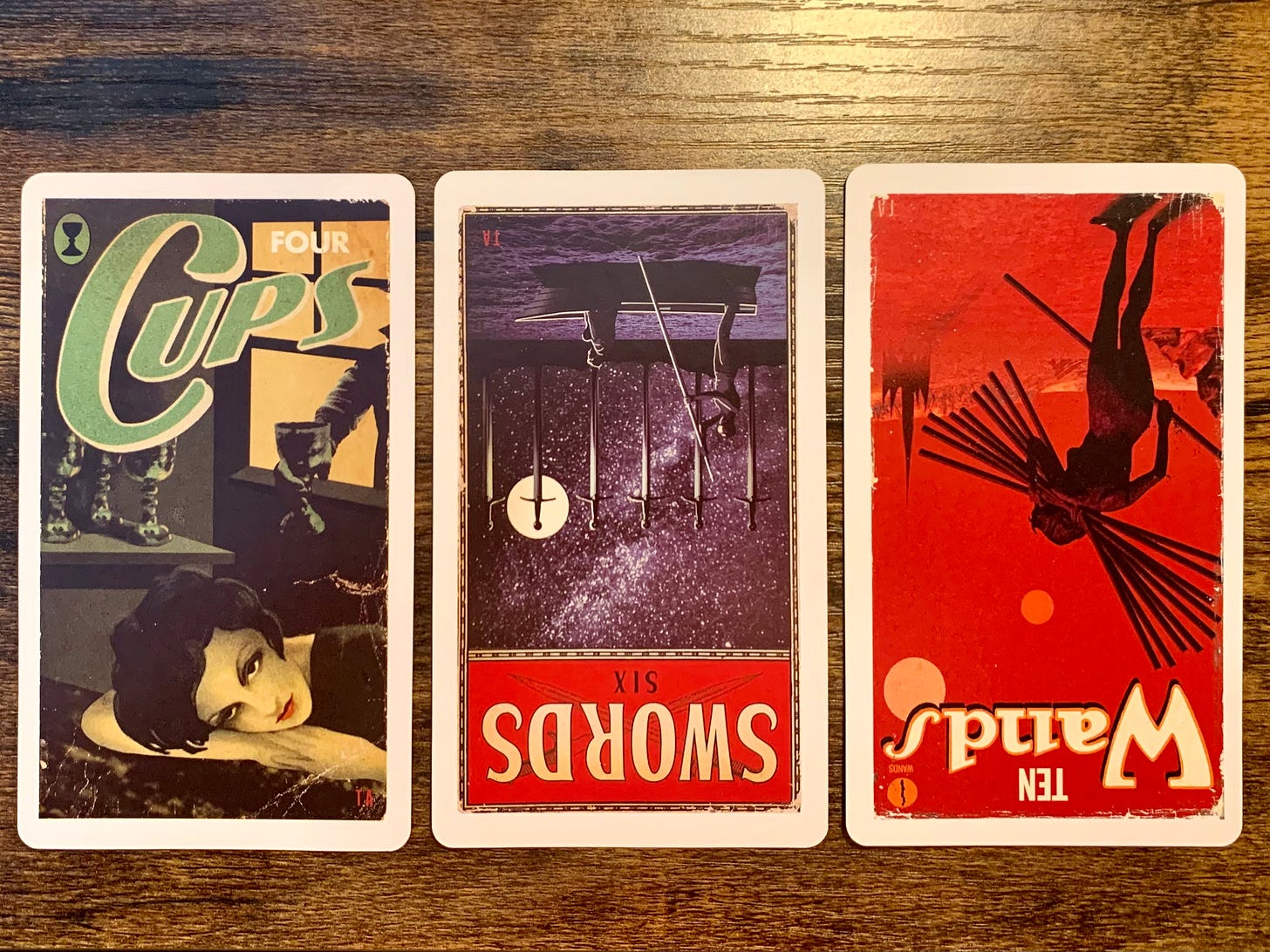The Weekly Three 1/29/24: The mousetrap of self-help cheese.
When does our desire to become better lead to a never-ending sense of not-enoughness and exhaustion from constant striving?
You might be tired of going in circles or ignoring something that actually needs your attention. Or does this feeling of being over it go just a little deeper?… Whatever rings true for you this week, something’s being dropped from the generative-energy roster like a hot potato.
Welcome to The Weekly Three! Each Monday, I share a three-card Tarot spread to help you focus your intuitive energy in real life, and take action with intention inside your business.
I pull these cards with the collective energy of my community in mind, but if you want a custom spread of your very own, you can get it right here.
Know someone who might like this newsletter as much as you? Hit the button below to share—the more, the merrier!
In The Cards: Getting “over it.”
There’s a feeling of being too full of a (good? bad? neutral?) thing in this week’s spread as your unfinished business pops up yet again. When will it ever be finished? That may be entirely up to you right now.
The IV of Cups carries a real sense of boredom, apathy, over-itness toward an emotional situation. The stability of the number four creates a sense of security in your emotional state. “No thanks, I’ve had enough,” is what this card is saying. Enough of what, though? What’s inside that cup?
The VI of Swords reversed is asking us to go back. There’s unfinished business here that needs to be wrapped up. If you feel like your thoughts have been going in circles, this might be the reason. This is where the energy of expansion feels a little stymied and the universe says “not yet.”
A burden is laid down with the X of Wands reversed. The feeling of not being able to pull something over the finish line may have you feeling like you want to give up. Or you realize you’ve been carrying something for way. too. fucking. long. and it’s finally time to lay it to rest. Which is it? I can’t tell you (but you sure can!)
In Between: Growth fatigue.
Self-improvement. Personal growth. Professional development. Oh my fuck, they can be so much sometimes, at times too much. Having to visit and revisit all the things that are “wrong” with us, our blocks, our traumas, our triggers… Like, holy shit. It’s A LOT.
And if there’s anything that absolutely forces us to face down our demons early and often, it’s the pursuit of success. Because what even is success? What’s enough? When am I enough? And when am I enough enough that I can say I’ve been successful?
If you’ve ever felt burned out on becoming your best self, you’re not alone. A simple google search for “personal growth fatigue” brings up a whole bundle of articles about the topic. As long as self help and personal growth have been a thing, the exhaustion from constantly becoming better has likely plagued humanity as well. It’s not a new thing either.
In 1859, British author and standard-issue old white man with mutton chops, Samuel Smiles, published a book titled Self-Help; with Illustrations of Character and Conduct. It sold a whopping 20,000 copies within its first year. By the time he kicked the bucket 45 years later and ascended to self-righteous white man heaven (which I’ve heard is superior to all the other ones,) it had sold over a quarter of a million copies.
While Self-Help was in no way a standout, stand-alone work in the market at the time, it is where the entire self help industry gets its name.
Victorian historian Asa Briggs, (which could be a delightful children’s book title,) dedicated an entire section of his book, Victorian People: A Reassessment Of Persons And Themes, to Samuel Smiles and Self-Help. He begins by saying:
“Every society has its propagandists who try to persuade their fellow-citizens to develop a special kind of social character which will best serve the needs of the day. In mid-Victorian England one of the most important propagandists was Samuel Smiles…”
Briggs went on to describe some of Smiles’ philosophical foundation for the ideas put forth in his writing:
“The poor man’s remedy lay in his own hands. If he were only hard-working, thrifty, and determined, he could do anything.”
You can also very easily see the theme in the virtues Smiles extolled, as well as what was valued by mid-Victorian society, through the consequent titles of his books: Character, Thrift and Duty.
But an ideal is one thing. Reality is a different beast altogether.
Personal development based on false narratives and harmful classist stereotypes will always fail to take the reality of systemic inequity into account and place us in the actually-not-real framework of a meritocracy, whereby all societal ills are cured through hard work and puritanical restraint.
The fact remains in any era that generalized societal advice on how to be one’s best self is just that: general. Unless it takes true societal contexts into consideration, (and sometimes even when it does,) applying it to your own life down to the letter will result in that constantly chafing friction between real life and a glorified ideal. Often, it ends up simply being a tool that perpetuates the unjust power dynamics of the day.
There is a part of this whole personal growth thing where, yes: you are helping yourself become a better you. You are becoming a more resilient, more self-compassionate, more emotionally-intelligent and capable self. And there’s nothing wrong with that! It’s wonderful. It’s meaningful. It’s worthy.
But there’s also a dark side to all of this where the self you are attempting to become may be based on false and downright harmful assumptions about what is “best enough.” Especially for those who already hold marginalized identities, being gaslit into believing you are worth much less than those who are societally defined as “best” is even more painfully detrimental.
And if we are always trying to improve, there is the inherent and often unspoken burden of the idea that we’re not good enough. We need to be better. We need to be best. If there’s still room for improvement, (a runway that, for human beings PS, just happens to literally extend forever until we die,) then we can’t consider ourselves to be best enough yet. But neither do we have a metric for when to say “when.”
When is it enough?
I am tired just thinking about this.
In Your Business: Set it down.
Just, literally, put it down. Take a break. Take a breather. Clear some space and then leave it blank.
What are you carrying around, mentally or otherwise, because you think it will somehow contribute to you being more better? And is it actually doing that, or is it just weighing you down and making you feel like shit about yourself??
Setting down your burden might be just what you need to be able to make that call.
If you really do need that thing, you can always pick it back up again. But if you don’t, just leave it and show yourself some compassion instead.
In any case, carrying a thing to the point of absolute exhaustion doesn’t help you get to your destination faster.
You might have some projects that you’re rethinking right now. Ones that maybe don’t fit the evolution of your goals or definitions of success. This is your reminder that as you evolve, you’re allowed to let things go.
In fact, sometimes it’s necessary in order for that evolution to occur.
Until next week,
Zoha
PS - The Ownership Method is a reader-supported publication. Did you find this post helpful or valuable in some way? Consider becoming a paid subscriber or leave a one-time tip to show your support:
About The Author:
Zoha Abbas is a writer, Intuitive Tarot Reader and Business Coach who aims to explore the small business conversations around self-trust, critical thinking, reality checks and forging your (not so straight) path to success in the grey-area of real life. She is the CEO and Creator of The Ownership Method, a coaching practice where she helps fellow entrepreneurs and small business owners do business better through data, divination and dismantling harmful systems.
For inquiries, please email: zoha@theownershipmethod.com




